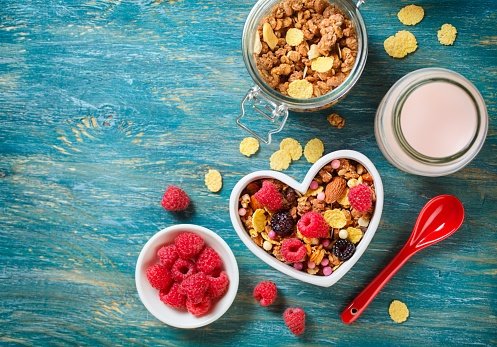 The latest healthy food and diet trends should have no bearing on your eating habits.
The latest healthy food and diet trends should have no bearing on your eating habits.
In fact, the more you listen to diet hype, the further you get from establishing a routine that will keep you feeling fit and healthy for the rest of your life.
Isn’t it time you refined your eating habits?
Tips For A Healthy Lifestyle And Eating Habits
- Begin every day with breakfast. Your metabolism needs a jump-start in the morning, and a glass of juice or cup of coffee won’t cut it. People who eat breakfast regularly receive more essential vitamins and eat fewer calories throughout the day. People struggling with weight and a lack of energy are often ones who overeat at the beginning of the day. In theory, eating first thing in the morning reduces hunger and helps you to make healthier food choices throughout the rest of the day.
- Be your own cook. Preparing more of your own meals puts you in charge of the food you consume. You know what goes into your meals and you’re more likely to make healthy meal substitutions. Concentrating on how you feel after you eat a convenience meal through takeout or at a sit-down restaurant will act as a deterrent to eating meals that only make you feel over-stuffed and uncomfortable.
- Focus on portion control. Starting the day with breakfast jump-starts your metabolism, while small, healthy meals throughout the day keeps it going and helps you maintain your energy. Visual cues help with portion control too. A serving size of meat, fish or poultry should be the size of a deck of cards, while a serving size of starches – potatoes, paste or rice – is about the size of a light bulb. Feeling satisfied after the end of a meal also has a lot to do with the types of foods you should eat. For example, whole grains and leafy greens go a long way with helping you feel full.
- Snack smarter. If you have a sweet tooth, stay away from artificially flavored snacks and stick closer to fruits or natural peanut butter to satisfy it. Unsalted nuts and low-sodium trail mix – and other low-sodium snack mixes – is another route to take. Yogurt and granola, tuna and whole grain crackers, or celery and hummus are all great, smart snack pairings.
- Drink more water. Soda and sweetened iced teas contain sugar and unnecessary elements that harm bodily functions instead of helping them. Water helps flush the body of toxins and other waste products. Headaches, low energy and tiredness are all a result of not drinking enough water. Many people confuse being thirsty with being hungry, so at the first hunger pain, reach for a glass of water to hydrate before considering a meal or snack option.
- Make meal planning a priority. Being predictable with your eating habits isn’t a bad thing. Regimented eating creates the rubric for smarter shopping and easier meal making. Plus, being careful with what and when you eat allows you to count calories, should you so choose, but more importantly it helps you to establish healthy eating habits without a whole lot of work.
Why Healthy Eating Habits Are Important
When you change your eating habits for the better, you change your life to live healthier and longer.
It’s important to establish a way of eating that can’t be uprooted or derailed by a lack of resources. We recommend using the healthy eating tips above to help you define what, when and how to eat. They comprise a practice that results in a healthier mind as well as a healthier body.



